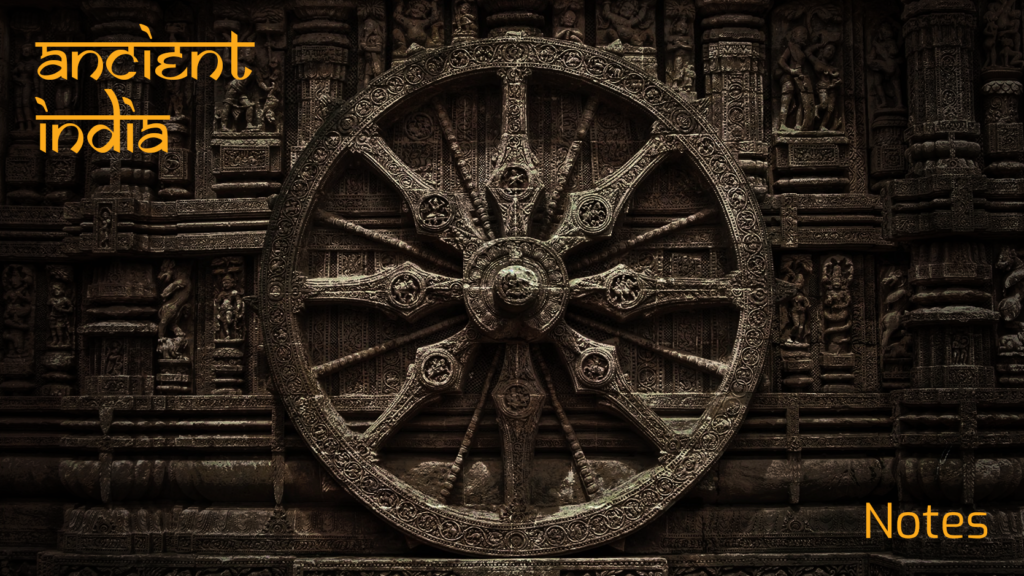Ancient History Notes: The foundation of India’s identity, Ancient History Notes for UPSC provides insights into the rich cultural diversity, literature, art, architecture, and religious traditions of ancient civilizations. They establish connections between historical occurrences, promoting an extensive understanding of the historical timeline and its influence on contemporary dynamics. For both the Prelims and Mains, ancient history is essential. The UPSC’s Detailed Ancient History Notes can help with both crafting thorough Mains answers and multiple-choice answers.
We shall discuss the UPSC Ancient History Notes in this article, with a focus going to GS Paper 1. You may gain the knowledge and understanding necessary to ace the exam by studying carefully designed ancient history notes. This will also help you to understand India’s complex historical legacy and how it has shaped the country’s present and future.
Ancient History Notes Overview
The syllabus for ancient history in UPSC covers various periods and civilizations in ancient India.
It includes topics such as the Indus Valley Civilization, the Vedic Period, the Mauryan Empire, the Gupta Empire, the post-Gupta period, religious movements like Buddhism and Jainism, and cultural developments.
Ancient History Notes
The Indian Subcontinent’s earliest known civilization is the Indus Valley Civilization. Known by another name, the Harappan Civilization, it flourished about 2500-1700 BCE. The Indus Valley Civilization is the largest of the three ancient civilizations, the others being Mesopotamia and Egypt.
- Indus Valley Civilization – Art and Architecture
- Harappan Architecture and Town Planning
- Mahajanapadas
Ancient History Notes for UPSC – Buddhism and Jainism
Buddhism and Jainism, which promote moral behavior and self-transformation, arose in response to popular Vedic rites and societal expectations. They stimulated advances in philosophy, architecture, and the arts and helped to diversify the religious landscape of India.
- Buddhism (Part I)
- Spread and Decline of Buddhism in India
- Buddhist Centres of Learning and Pilgrimage Sites
- Buddhist Art and Architecture-I
- Bhakti Movements in North India
- Bhakti Movements in Other Regions of India
- Buddhist Art and Architecture- II
- Buddhist Literature
- Jainism
- Jain Art and Architecture
- Jain Literature
- Schools of Indian Philosophy: Orthodox and Heterodox
UPSC Ancient History Notes – Southern India
Strong dynasties like the Cholas, Cheras, and Pandyas flourished in southern ancient India, an area rich in cultural and marine legacy. These kingdoms, which placed a strong emphasis on trade and commerce, supported thriving port cities like Mamallapuram and Kaveripattinam, which in turn enabled cross-cultural contacts.
- Kingdoms, Administration, Society & Economy of the Sangam Age
- Gurjara-Pratiharas
- Bhakti Movements in South India
- Art, Architecture & Literature of Sangam Age
- Ashoka
- Satavahana Era
- Pallavas of Kanchi
- All About Rashtrakutas Dynasty
- All About Pala Dynasty
- Imperial Cholas: Art, Architecture and Literature
- Imperial Cholas
- Pallavas of Kanchi
Ancient History of India – Mauryan Empire
Chandragupta Maurya established the Mauryan Empire, which signified a significant period in the history of ancient India. The vast territory of the empire, with Pataliputra as its capital, was unified under the administration structure described in Chanakya’s Arthashastra.
- Mauryan Empire: Part I
- Post-Mauryan Age: Northern India
- Post-Mauryan Kingdoms in North-Western India
- Mauryan Art, Architecture, and Literature
- Administration is the Mauryan Empire
- Society, Economy & Religion During the Mauryan Era
- Post-Gupta Era
Preparation Tips for UPSC Ancient History
Below we have provided some steps to prepare Ancient History for the UPSC exam –
- Understand the Syllabus: Familiarize yourself with the UPSC syllabus for Ancient History. It usually covers topics like the Indus Valley Civilization, the Vedic Period, Mauryan and Gupta Empire, etc.
- Study Material Selection: Choose reliable study materials. NCERT textbooks from Classes 6 to 12 are excellent resources. Additionally, you can refer to standard reference books like “Ancient India” by R.S. Sharma or “India’s Ancient Past” by R.S. Sharma.
- Make Notes: While studying, make concise notes. Highlight important dates, events, personalities, and concepts. These notes will be handy for quick revisions.
- Timeline Formation: Create a chronological timeline of ancient Indian history. This will help you understand the sequence of events and their interconnections.
- Use Visual Aids: Utilize maps, timelines, and charts to visualize historical events, locations, and dynasties. Visual aids can enhance your understanding and retention.
- Practice Questions: Solve previous years’ question papers and sample papers. It will give you an idea about the exam pattern and help you assess your preparation level.
- Revision: Regularly revise what you have studied. Revision is crucial for retaining information in memory.
- Stay Updated: Keep yourself updated with any changes in the syllabus or exam pattern. Also, stay informed about recent archaeological discoveries and research in ancient Indian history.
- Mock Tests: Take mock tests to simulate exam conditions. It will help you manage time effectively during the actual exam.
- Stay Consistent: Consistency is key. Allocate a fixed amount of time daily for studying ancient history and stick to your schedule.
- Seek Guidance: If you have doubts or need clarification on any topic, don’t hesitate to seek guidance from teachers, mentors, or online forums.
- Stay Motivated: Lastly, stay motivated and maintain a positive attitude throughout your preparation journey. Remember your goal and keep working toward it diligently.

